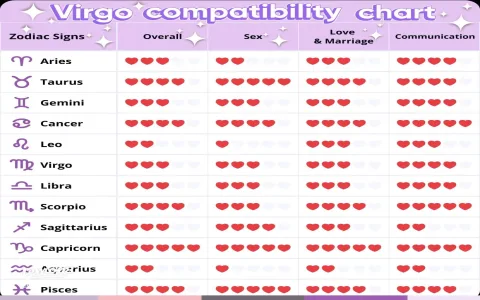We Needed a System, Not Just Vague Love
Look, I’m a Male Taurus. I value peace and quiet. I like my routine, and frankly, I like being comfortable. I worked hard to get this stability. My wife? She’s a Virgo, bless her heart. She notices everything. And I mean everything. If I leave a mug next to the sink instead of in it, it’s not just a misplaced mug; it’s an indictment of my entire organizational structure. She focuses on the details; I focus on the final outcome (the kitchen is clean eventually, right?).
For the first few years, we thought we were fine. We loved each other deeply, sure. But we kept hitting the same brick walls. I’d retreat into silence and start watching TV; she’d start listing the 17 things I messed up that day, usually under her breath, getting louder and louder. I tried apologizing quickly, I tried arguing back, I tried ignoring it—all bad moves. Ignoring her detail-oriented frustration just made her explode later, and my quick apologies felt fake to her analytical mind.
The real turning point? It happened last spring. We were supposed to go to my sister’s birthday party. Ten minutes before we needed to leave, we erupted over a tube of toothpaste. Seriously. I squeezed it from the middle; she said it ruined the structural integrity of the tube and wasted product. She accused me of being lazy; I accused her of being insane and hyper-critical. We missed the party. We spent the next three days walking around our cozy home like tense strangers. That silence, that awful tension—that’s what killed my Taurus peace.

The Practice: Structuring Conflict Like a Project
I realized we couldn’t just rely on love to smooth over these fundamental differences in how we approach life. We needed an actual, tangible system. Something rigid. Something that satisfied my need for a predictable outcome (Taurus) and her need for a meticulous process (Virgo). So I sat down one Saturday morning while she was out at the farmer’s market and hammered out three simple rules. I even wrote them down on an index card and stuck it to the fridge with a magnet.
When she got home and read the card, she was skeptical, but the structure appealed to her. We tweaked the timeline slightly and finalized the plan. This wasn’t counseling; this was process management for domestic peace.
Rule 1: The Cooling Period. If a fight starts and either person says the agreed-upon code word (“Pause”), we stop talking immediately. We agreed on a mandatory 30-minute separation. I go into the garage or put on headphones and sit outside; she goes to the spare room or works in the garden. No texting, no glaring, no slamming doors. This is crucial for the Taurus need to decompress and the Virgo need to analytically process without feeling verbally attacked.
Rule 2: The Formal Complaint Submission. After 30 minutes, if the issue still feels important, we write it down. This forces clarity. No vague accusations. You must state the action (e.g., “The dirty dishes were left on the counter for 4 hours”) and state the emotion it caused (e.g., “This made me feel disrespected and overwhelmed by clutter”).
Rule 3: The Scheduled Discussion. We cannot discuss the complaint until the next morning, over coffee, or after we are both fed and rested. We sit down at the kitchen table, read the complaint aloud, and each person gets three minutes uninterrupted to respond. I respond only to the action/emotion written down, not to new grievances she brings up in the moment. She responds only to my explanation. We shake hands and move on.
Implementing the System During the ‘Car Key Crisis’
It didn’t take long to test this monstrosity of a process. A week later, I left my keys on the counter instead of in the key bowl. My Virgo wife spotted it immediately and started her usual low-level humming of disapproval, which quickly escalated into a snarky comment about my memory. Instinctually, I started to snap back, but then I remembered the index card.
I literally held up my hand and said the code word: “Pause.”
She rolled her eyes—she really did—but she honored the process. I went to the garage and listened to music for 30 minutes. I let the annoyance drain away. When I came back inside, the atmosphere was still heavy, but the potential for an all-out war was gone. We went straight to Rule 2. She wrote her complaint: “Keys left outside of designated area caused disruption to my routine and required me to search briefly before leaving, causing frustration.”
I read her note, and I wrote my counter-note: “Felt immediate, unfair judgment for a minor mistake, causing defensiveness and retreat.”
The next morning, we had our coffee discussion. Because the argument had already been formalized and deferred, it wasn’t a fight; it was a stiff, businesslike negotiation. I admitted my habit was annoying and promised to put the key bowl closer to the door; she agreed that her immediate reaction was too critical and promised to use the ‘Pause’ button herself next time she felt the urge to jump straight to criticism.
The Result: Less Drama, More Stability
- Conflict Duration Slashed: Fights that used to ruin the whole evening now last 30 minutes plus a 5-minute chat the next day.
- Clarity Achieved: We now fight about the issue itself, not about the emotional baggage surrounding it. The written complaint makes it tangible.
- Taurus Peace Protected: Knowing there’s a structured way out of tension keeps my blood pressure low and ensures I get my mandatory decompression time.
- Virgo Order Maintained: She gets her complaint formally logged and acknowledged. The process itself is orderly, which satisfies her need for control.
If you’re dealing with that earth-sign friction—the stubborn bull meeting the critical maiden—you need structure. Don’t try to change your personalities; just change the battleground rules. It saved us a lot of grief, and honestly, it made our home feel like the peaceful sanctuary I, the stubborn Taurus, always wanted it to be.






